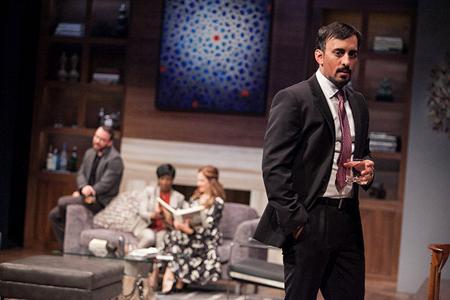‘Disgraced’: Islamic Identity at Arena Stage
By • May 4, 2016 0 1244

Contemporary social and political issues — the daily headlines of our lives — make compelling material for live theater.
Since 9/11, that seems to be especially true for everything to do with Islam. Thinking and talking about the Middle East, about religious identity and meaning, about the threat of terrorism, about followers of Islam — including those in America and those wanting to come to America — have all managed to find their way onto our stages.
Consider that Ari Roth’s new Mosaic Theater Company has just wound down its Voices from a Changing Middle East festival with plays like “Hkeelee,” “After the War,” “Promised Land,” “I Shall Not Hate” and “Wrestling Jerusalem.” Beginning with his previous stint at Theater J, Roth has been something of a pioneer when it comes to plays touching on the Middle East and on the tense and intense relations between Arabs and Jews, between the West and Islam.
The work of Pakistani American playwright and writer Ayad Akhtar, which deals with Islam and cultural identity in America, are on Washington-area stages this month. Akhtar’s “The Who and the What,” about a Pakistani American female writer working on a novel about women and Islam, will be staged at Round House Theatre in Bethesda from May 25 through June 19.
Akhtar won a Pulitzer Prize for “Disgraced,” his intensely dramatic play about an assimilated Pakistani attorney confronting his identity during the course of a dinner among friends and relatives in New York.
“Disgraced,” which had two different productions in New York, including a successful Broadway turn, is at Arena Stage through May 29, directed by Timothy Douglas. Arena has been a veritable political hotbed this season, what with the Georgetown-political-salon-centric “City of Conversation” by Anthony Giardina; “Sweat,” Lynn Nottage’s play about the effects of industrial decline in America; and “All the Way,” Robert Schenkkan’s searing, Tony Award-winning play about LBJ attempting to get a Civil Rights bill through a recalcitrant Congress during an election year.
“Disgraced” is about as hot-button a play as can be, especially during the current presidential campaign, as it focuses on the fate of Amir Kapoor, a Muslim American, a Pakistani and a corporate attorney at a high-powered New York Jewish-owned law firm.
For actor Nehal Joshi, a Burke, Virgina, native, who’s had a varied career full of challenging roles, the role of Amir is “tough,
really intense.”
“It’s so contemporary, it’s so hard-hitting. It doesn’t pull any punches. There’s no black or white stances,” Joshi said. “Amir is a Muslim, but he’s almost totally assimilated. He works for this really top-notch law firm and is set to make partner, and his wife is this really creative, intelligent white woman who’s working on a project dealing with Islamic art. His nephew somehow persuades him to do legal work for an imam who’s been accused of having connections to terrorism. And from there, we have this dinner hosted by his wife, with his Jewish friend and his African American wife, who works at his firm. And during the course of it all, things are said, questions are raised, and he’s forced to confront himself, his feelings about the Koran, about his religion, about his place in America.”
“You have to find yourself in that part,” he said. “And you know, I’ve run across it. How people react to you, your name or how you look. And they make assumptions without knowing you at all. My family isn’t Muslim, they’re Indian, but even so, you have to think of history. And in New York, after 9/11, even though he’s living in some ways the American Dream, there’s no way that you can avoid your identity.”
Joshi comes across as thoughtful, not just about the issues in the play, but about acting, and the acting world, the parts he’s gotten and taken and what he’s done with them. “I’m really glad to be back here at Arena,” he said. “It’s a kind of home. And you do things here, you stretch, you go against the grain.”
Probably the biggest Arena memory for him was playing the part of the peddler as an ethnic Middle Eastern character in Molly Smith’s production of “Oklahoma.” His peddler was funny, engaging, a guy trying to catch both his Western version of the American dream and a winsome local girl, who was also being courted by a cowboy.
“That was unusual for audiences. You don’t usually think of that character that way, but there’s historic precedents for it. There were many immigrants in the West then. It was the place where you could start over, and there were, in fact, peddlers like that.”

